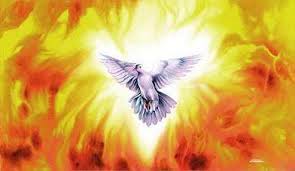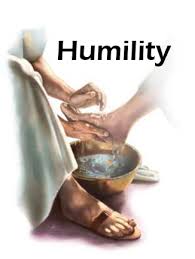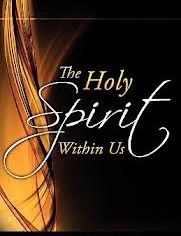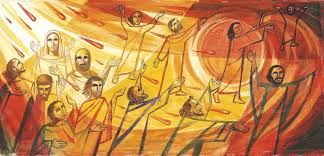
5th June 2022-
Pentecost Sunday
Gospel reading: John 14:15-16; 23-26
vs.15 Jesus said to his disciples:
“If you love me you will keep my commandments.
 vs.16 I shall ask the Father, and he will give you another Advocate to be with you for ever,
vs.16 I shall ask the Father, and he will give you another Advocate to be with you for ever,
vs.23 If anyone loves me he will keep my word, and my Father will love him, and we shall come to him and make our home with him.
vs.24 Those who do not love me do not keep my words. And my word is not my own; it is the word of the one who sent me.
vs.25 I have said these things to you while still with you;
vs.26 but the Advocate, the Holy Spirit, whom the Father will send in my name,
will teach you everything and remind you of all I have said to you.”
*******************************************
We have four commentators available from whom you may wish to choose .
Michel DeVerteuil : A Trinidadian Holy Ghost Priest, director of the Centre of Biblical renewal .
Thomas O’Loughlin: He is on the theology faculty of Nottingham University
Sean Goan: Studied scripture in Rome, Jerusalem and Chicago and teaches at Blackrock College and works with Le Chéile Schools.
Donal Neary SJ: Editor of The Sacred Heart Messenger
*******************************************************
Michel de Verteuil
Lectio Divina The Year of Luke
www.columba.ie
General Textual comments
Jesus is about to leave his apostles and as he gets ready to do this, he begins to speak to them about something that will happen and which will be of tremendous importance for them and for understanding him and where he is coming from.
He tells them of the future coming of the Holy Spirit. He speaks of two things:
– of how close he will be to their own insights
– of what he will teach them, how he will add to what they have already learnt from him.
He makes two radical points which he stresses right through his teaching. Today, after our long distance from the time of Jesus, we look at them with a better understanding of all this implies for us today.
a) The first point is that the Spirit will be true to the teachings of Jesus, those he gave to the apostles and which they must retain for ever. These are tremendously important teachings which we must understand today whatever happens. What happens to us does not matter because Jesus was aware of them even from where he stood at the time of his leaving his followers.
 b) The second is that the Spirit will often bring out new things – or, rather, things which seem very new to us. In fact, there will be great changes from what the Church thought it had learnt directly from Jesus. They will therefore be “new”.
b) The second is that the Spirit will often bring out new things – or, rather, things which seem very new to us. In fact, there will be great changes from what the Church thought it had learnt directly from Jesus. They will therefore be “new”.
We can now see more clearly than ever before a few important things: where the disciples were and what their theology was , how they looked on their world; where Jesus wanted to bring them to and the world in which he wanted them to live.
Let us look at these two aspects of the work of the Spirit as they are revealed in this text.
In verses 15 to 16 Jesus says clearly that the Spirit will be “old”. The Father knows the Spirit. They will know that whatever he teaches is from the Spirit since the Father has always been “with him” and he is also “in him”. It is essential then that those who follow the Spirit always make the link between what Jesus said and what they now believe.
On the other hand, he will come with something that seems new. He will conquer whatever weaknesses people will be able to discover in Jesus’ revelations. He will say things which “the world cannot receive” since it does not know him nor his full revelation.
In verses 23 to 24, the teaching of the Spirit is “old” in the sense that we shall always come back to Jesus. We will always learn new things from him, from what he revealed to them. Whatever he inspires in us, we will eventually learn to love the Father in him, and Jesus too will make his home with him.
It is “new” in the sense that what he will say will be what he has learnt from the other two. We who love him will find in his words “the word of the one who sent him.” He will be revealing what he has learnt from the other members of the Trinity.
In verses 25 to 26, his teaching is “old” in the sense that his word is not his own but the word of the one who sent him. This is Jesus who “has said all these things to him from the beginning”. His words are all lasting therefore and will remain valid whatever happens in the future.
His teaching will also be “new”.
“The Advocate, the Holy Spirit whom the Father will send in my name”, he will “teach you everything and remind you of all I have said to you”. The Spirit will therefore remind the disciples of all he said to them as he faced his passion.
Prayer Reflection
“If you wish to attain your being in which God created you, in all nobleness, you must not reform any difficulty, with all the hardiness and prize you must neglect nothing but valiantly seize the best part. I mean the totality of God as your wealth.” ..Blessed Hadewight of the Holy Beguines
Lord, we pray for the grace to remember the teachings of Jesus.
Help us to recognise his presence among us and to look forward to them.
We thank you for sending your Holy Spirit into our Church of today.
We thank you that the work of the Spirit is new
and we must learn many things from what we now see happening in our present world.
It is also old, however, and it must always return us to the original teaching of Jesus
and of the Father who spoke through him.
We realize today how many wonderful things we can learn from the newly established importance of women in the world today, from all they have done.
We must now re-learn and re-discover the many things he taught us
and which became lost in the all-male world in which it grew and developed.
We remember today the great thing within our Church,
– in the world as we relate with it apart from the Church,
– in the secular world which makes no reference to the Church in its findings and discoveries.
We think today of the many things we learn from those who belong to other Christian religions, which we had tended to look down on.
We remember with great sadness
 – the distance maintained by the Roman Pontiffs and other leaders of our Church in the face of the founding of the World Council of Churches and other ecumenical work in the world;
– the distance maintained by the Roman Pontiffs and other leaders of our Church in the face of the founding of the World Council of Churches and other ecumenical work in the world;
– we remember similar attitudes, maintained by the leaders of other Churches, when they found that their own insights were no longer accepted by our Church and so considered themselves far from us.
– We think today of the many things we have learnt from those who
follow other religions which we once considered far from ours.
– We think of those who follow other religions tied to the people of the East,
the followers of Confucius, Buddha, the Bhagavad Gita and other Eastern sages.
Help us Lord in our time to welcome them among us and to learn from them.
– We remember the great sages of the Muslim faith.
– We thank you for what they can now teach us in our faith and understanding.
– We think of those who belong to the great religions of Africa, and also of North and South America.
We thank you for the wonderful lessons we have learnt from them
– their sense of the greatness of God, present in every creature
– their sense of the protection of every person on earth
– their connection with all who have died.
We remember the very great people who have been torn away from our fold for what they have seen wrong.
They now seem to have no religion at all. We thank you for all that we have learnt from them.
*********************
Thomas O’Loughlin
Liturgical Resources for Lent & Eastertide
www.Columba.ie
Introduction to the Celebration
Today we are celebrating a feast that was celebrated by many of the Jews who lived at the time of Jesus. Many of his early followers continued to celebrate it after the resurrection, and so it became part of the annual celebrations of all Christians. However, over the first few decades of the church, this feast took on a new meaning:
Jesus has risen and ascended to the Father,
but he promised us his Spirit. So to day we rejoice that the Spirit is moving in each of our hearts making us a people, inspiring us to understand the mystery of our faith, and strengthening us to follow Jesus the Anointed One.
day we rejoice that the Spirit is moving in each of our hearts making us a people, inspiring us to understand the mystery of our faith, and strengthening us to follow Jesus the Anointed One.
Gospels: Jn 20:19-23 and Jn 14:15-16; 23-26
Jn 20:19-23 presents the Spirit as the source of forgiveness within the church, animating it to be the messenger/builder of forgiveness in the world. This gospel, with its clear emphasis of the Spirit as the life force of the church’s ministry, is to be preferred to the optional choice for year C.
(Option for Year C: Jn 14:15-16; 23-26 presents the Spirit as the teacher who leads us into all truth. In John these promises form part of Christ’s farewell prayer for the church.For the vigil reading see year A.)
Homily Notes
1. There are two popular themes in preaching Pentecost that miss the point of this feast.
First, that it is the ‘feast of the Holy Spirit’ as if this were analogous to 15 August as ‘Mary’s feast’ or 17 March as ‘Patrick’s feast’. One cannot have a feast for a divine Person! Every feast, every day, every prayer is the Spirit’s, or it is nothing! Just note how silly the phrase ‘the Spirit’s feast’ is: which is the Father’s feast, or do we imagine Mary is more important as she has more feasts? The implication of this approach is to use the homily for a user-friendly treatise on the Spirit.
The second false trail is to say that this is the ‘birthday of the church’, on the supposition that birthdays are one of the few special times our culture understands. As a metaphor it can be quite useful, but it trivialises what is at issue by making it simply one of recalling the ‘First [Christian] Pentecost.’ Then the homily becomes a recollection of the Luke’s idealised, imaginative picture of apostolic times. This not only perpetuates a false view of the early church, relies unwittingly on a fundamentalist scriptural hermeneutic, but misses the feast’s central message.
 2. Our belief is that the Spirit is coming upon us now, he who is ‘Lord and giver of life’, is descending now upon the church — at every moment, in every good thought and action, in every assembly — and giving us life and empowering us. We, in the congregation assembled, hold this feast to remind ourselves of this unseen presence in our lives, and to invite ourselves to call on him to empower and enlighten us. It is not the Spirit as the third Person of the Godhead, nor an event in Jerusalem long ago that we celebrate, but the Spirit as the life-giving core of our lives as a local church, gathered now for a meal to strengthen us to continue in our work of building the kingdom. We are celebrating someone who is already within us, or we would not be here are all.
2. Our belief is that the Spirit is coming upon us now, he who is ‘Lord and giver of life’, is descending now upon the church — at every moment, in every good thought and action, in every assembly — and giving us life and empowering us. We, in the congregation assembled, hold this feast to remind ourselves of this unseen presence in our lives, and to invite ourselves to call on him to empower and enlighten us. It is not the Spirit as the third Person of the Godhead, nor an event in Jerusalem long ago that we celebrate, but the Spirit as the life-giving core of our lives as a local church, gathered now for a meal to strengthen us to continue in our work of building the kingdom. We are celebrating someone who is already within us, or we would not be here are all.
3. How can we recognise the Spirit’s presence? How should we imagine the Spirit? These are questions we all pose and are often asked. We have an image of ‘the Father’ as the old man with the beard — it is limited, but it is there; we all have an image of the Son for we have umpteen images of the Word made flesh; but how can we relate to the Spirit as a dove or a flame or a wind? The answer is that we can only relate to the Spirit in an act of reflecting upon our own lives and actions — it is the Spirit within us that provokes these very questions within each of us, spurring us to grow in the mystery of the divine love.

4. So how can we extend that action of reflection to see the Spirit’s presence in our community? The Spirit’s gifts are, in reality, the Spirit himself, so we should celebrate the various ministries that exist within the community.
– Obviously those who minister in the liturgy (the Spirit empowering us to prayer calling on the Father),
– and those involved in charity in the community (the Spirit as the source of love).
– But also all who teach — not only as catechists (the Spirit promoting the kerygma) but every teacher (the Spirit as the enlightener of minds).
– ‘Then those who seek the truth in their work (e.g. journalists or scientists) for the Spirit leads us towards the truth.
– Then those who work of society’s good be they policemen or social workers or whatever — for the Spirit brings forgiveness and harmony.
– Then all who care for life, for the Spirit is the life-giver. One could keep going outwards to ever-wider circles until the whole community is included — for part of being a Christian is recognising that the Spirit is at work in every human heart.
– Wherever anything good, true, noble, or joyful happens, there is the Spirit at work. One of our tasks as the church is to discover how the Spirit is present and working in the world.
5. Instead of a discourse of words today, if you can think of some activity that would highlight how people in your community — in so many diverse ways — are animated for ministry by the Spirit, then you may have communicated the message of this day far more effectively than with a homily.
**********************************
3. Sean Goan
Let the reader understand
www.columba.ie
Gospel
This gospel text is almost the same one as used on the Sixth Sunday of Easter and it presents us with John’s understanding of the unique and vital role played by the Holy Spirit in the life of the believer. The entire section of John’s gospel known as the ‘Last Discourse’ (chapters 13-17) is presented as a kind of farewell speech or even last will and testament. Li it the evangelist explores who Jesus really is and how we, his followers, are united to him and draw life from him. To do this he uses a couple of key images: one is the dwelling place (v.14), the other is the vine (v.15). It is the Spirit in us who allows us to explore these ideas and to deepen our understanding of the profound mystery that has been revealed through the life, death and resurrection of Jesus Christ.
Reflection
The feast of Pentecost brings to a close the season of Easter because the gift of the Spirit is the inevitable outcome of the death and resurrection of Jesus. The church understood clearly that what happened to Jesus on Easter Sunday was not just an amazing miracle to prove that he really was the Son of God.
It was rather the next step in God’s desire to heal, once and for all, the relationship between himself and a broken humanity. Now the outpouring of the Spirit of Jesus means that our relationship with God is fundamentally transformed. So let’s celebrate of our new life in the Spirit and the birthday of the church as the new people of God.
****************************************************
4. Donal Neary S.J.
Gospel reflections
www.messenger.ie/bookshop/
Called into following Christ
Pentecost is really something new! The first reading has no blarney no recrimination for the death of Jesus – only a new call and new mercy. The gospel is about the coming of the Spirit and the main sign of the Spirit is forgiveness.
 There was a lot of need for forgiveness around in the first group of Jesus’ followers. They had let him down and had let each other down. They looked around and like any group felt memories of hurt shame, let-down, injury and harm. They saw those who had abandoned Jesus and tried to cover up the sin; or they saw others who just knew they had done wrong and were sorry. All were forgiven.
There was a lot of need for forgiveness around in the first group of Jesus’ followers. They had let him down and had let each other down. They looked around and like any group felt memories of hurt shame, let-down, injury and harm. They saw those who had abandoned Jesus and tried to cover up the sin; or they saw others who just knew they had done wrong and were sorry. All were forgiven.
And all are now called into the following of Christ. We follow Christ with all sorts of personal gifts, talents and sins in our back-pack. Like people on pilgrimage, we are cluttered. The Holy Spirit opens our hearts to let this baggage just fly away! We are people of freedom and of a new song.
What song do I sing in the presence of the Lord? One that brings me back into misery like singing of shame and misery or one that brings me into the freedom of the Alleluia? Can my heart dance with the joy and hope of Pentecost?

Ask this day for what gift of the Spirit you really want, and maybe include always the gift to be able to let go of hurt,
– to open the heart to all, and
– to forgive or if not,
– to want to forgive.
Holy Spirit, forgiveness of God, give me your true freedom.
*****************************************